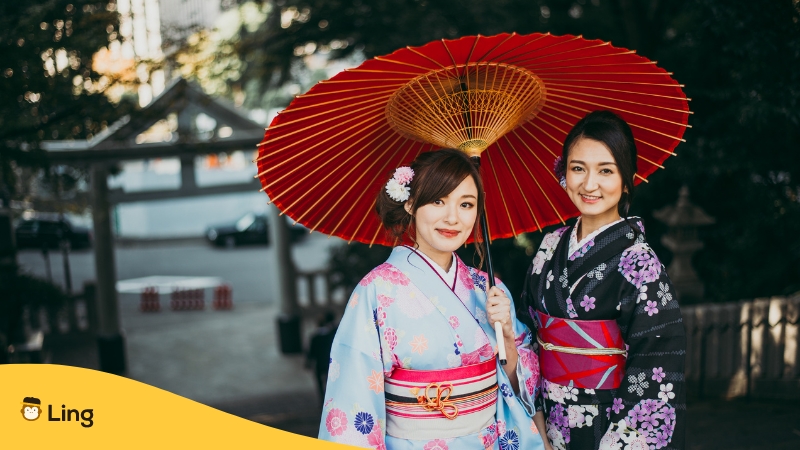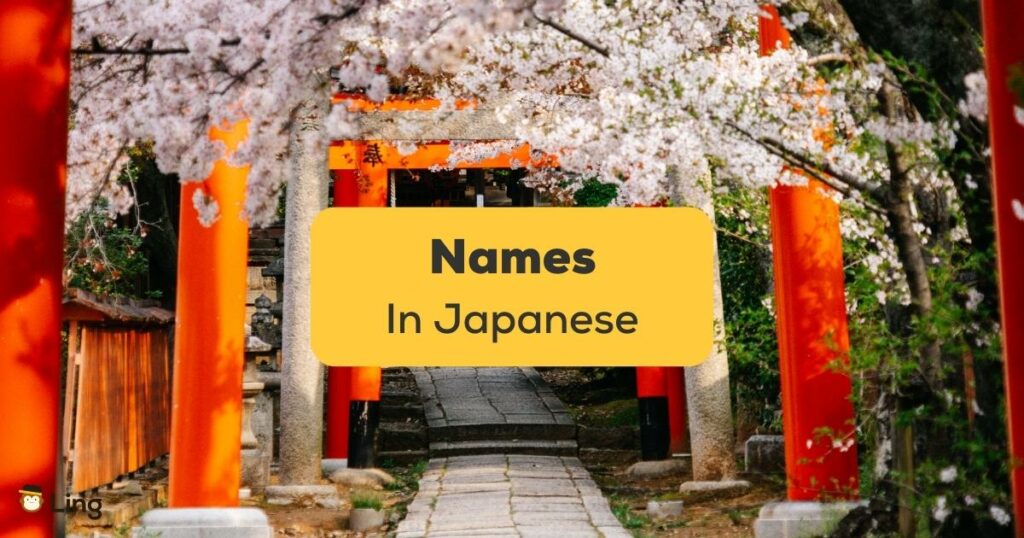My name, Mei, has consistently been in the top ten most popular baby names in Japanese for females, based on an annual survey revealed by nippon.com, which was a complete surprise to me. So should I be glad that my name is famous or sorry that it’s so common that it’s boring?
But when I think about it, a name is like a superhero’s cape, giving you power and identity! Like Japan, names in Japanese culture are more than simply a method to address someone properly; they also convey information about the person’s birth order and an amazing meaning when combined with the perfect kanji characters (Chinese characters). For example, Mei uses kanji 芽依, which means sprout and reliant. But, on the other hand, using 命 express the meaning of fate.
Following that, did you know that Japanese culture is about finding a deeper meaning in life? That’s why they put a lot of thought into naming their precious little ones. You’ll be amazed by how much thought and care goes into selecting a name that reflects their baby’s personality and future potential, which is truly inspiring.
We’ve got even more impressive aspects of Japanese names to share with you all! But before we dive into the fascinating world of a Japanese name, let’s start by learning some basic vocab for “name” in Japanese together!
How To Say “Name” In Japanese?
Alright, here’s a beginner’s list of Japanese vocabulary for all you newbies. If you need to fill out paperwork or register a new app in Japan, refer to this guide for help.
- Given name – 名 (na) *when pronounced as mei, it refers to a counter for people.
- Given name – 名前 (namae)
- Family name – 姓 (sei) *commonly used
- Family name – 苗字 (myoji)
Asking Someone’s Name in Japanese
Question: What’s your name? – 名前は何ですか? (name wa nandesuka)
Answer: (I’m) Naruto. – ナルトです。(Naruto desu)
Just a head up! If you’re a traveler or planning to move to Japan with a bit of knowledge of the Japanese language skill, remember these basic words when visiting Japan because you might only sometimes find an English version of a document or menu on a mobile app.

The Fascinating World Of Japanese Naming Culture
We just fueled up on some basic knowledge, and now I’m ready to dive into all the fascinating cultural highlights Japan has to offer! Who’s with me? Alright, time to learn new things!
Japanese Names Reflect The Birth Order
一 (ichi), 二 (ni), 三 (san), 四 (yon), 五 (go)… Japanese names in this topic will be much more entertaining to look at if you can count numbers in Japanese!
There’s an interesting tradition of 輩行名 (haikoumei) in Japan. It’s a custom where baby boys are given names based on their birth order. 輩行 (haikou) refers to family members of the same generation, typically siblings.
So here, I’m excited to share amazing Japanese baby names that combine numbers and the character 郎 (rou) to create a unique counter.
| Birth Order | Japanese Names (Kanji) | Pronunciation |
|---|---|---|
| First son | 一路 | Ichirou |
| First son | 太郎 | Tarou |
| Second son | 二郎 | Jirou |
| Second son | 次郎 | Jirou |
| Third son | 三郎 | Saburou |
| Fourth son | 四郎 | Shirou |
| Fifth son | 五郎 | Gorou |
| Sixth son | 六郎 | Rokurou |
| Seventh son | 七郎 | Shichirou |
| Eighth son | 八郎 | Hachirou |
| Ninth son | 九郎 | Kurou |
| Tenth son | 十郎 | Juurou |
A quick heads-up for all my fellow Japanese culture enthusiasts out there. If you come across Japanese names that sound alike but are written differently in kanji, they won’t be considered 輩行名 (haikoumei) anymore. Keep that in mind!

Names In Japanese That Are Related To Nature
Do you love traveling to Japan for its beautiful scenery too? Of course, Japan has a lot of beautiful, untouched nature, so it makes sense that you would think that way.
You know what? Japanese people have a solid connection to nature that you might not have realized that they believe there’s a spirit that protects the forest.
That’s why Japanese people often choose nature-related names for their children. So it would be cool to share some Japanese names inspired by nature with positive meanings. Check them out!
Female
| English | Japanese Names |
|---|---|
| Sakura (Cherry blossom) | Sakura |
| Blossom | Hotaru, Kanon |
| Red plum | Akari |
| Spring flower | Akina |
| Flower | Hana, Hanako, Hanae |
| Harmony of flower | Honoka |
| Beautiful blossom child | Misako |
| Child of greens | Nanako |
| Flower from heaven | Nara |
| Child of the cherry blossom | Sakurako |
| Butterfly child | Choko |
| Summer child | Natsumi |
| Winter child | Fuyuko |
| Thunder child | Nariko |
| Evening child | Sayoko |
| Sprintime | Haru |
| Sunshine | Harue |
| Spring beauty | Harumi |
| Moon | Katsuki |
| Sun | Hina |
| Sound the wind makes | Kazane |
| Rice valley | Maiya |
| The sound the wind makes | Momoka |
| Forest child | Moriko |
| Sunshine | Youko |
Male
| English | Japanese Names |
|---|---|
| Morning sun | Asahi |
| Rising sun | Kosuke |
| To bear fruit | Minoru |
| A large sea | Taru/Toru |
| Honorable bird | Taka |
| Sunlight | Haruto |
| Wind | Kaze |
| Sea | Kai |
| Earth | Daichi |
| Autumn | Aki |
| Snow | Yuki |
| Bright | Akira |
| Vast tree | Hiroki |
| Big river | Taiga |
Names That Are Becoming More Creative As Individualism Rises
Have you heard that Japan is famous for having a society that values harmony? But, on the flip side, some people say it can be restrictive.
Some feel like it discourages individuality and standing out from the crowd. However, according to research published on Japantimes.co.jp, more parents choose unique names for their children. It seems like Japan is moving towards valuing individualism more as a society.
Some examples of unique names are;
- 心人 (Haato), which refers to the heart.
- 今鹿 (Naushika), the main character in the Ghibli movie “Nausicaa of the Valley of the Wind.”
Aside from that, there is yet another mesmerizing aspect of Japanese culture. Did you know that Japan is a gender-gap society where males hold more power and importance than females?
Gender stereotypes abound, with boys often seen as more brave and independent than girls. As a result, many parents intentionally choose rare Japanese girl names for their daughters.
So, they’re taking steps to ensure their baby girl develops into a strong individual who stands out through naming. Unfortunately, because of that, more boys than girls are given common names.
Let’s see examples of unique Japanese girl names below!
- Kyō, means capital city.
- Tsubame, means swallow bird.
- Yaeko, means multilayered child.
- Masuyo, means benefit or profit.
- Minato, means harbor.
In Summary
Wow, there are so many Japanese names! Here are just a few out of the hundred or so that exist. Are you considering fully immersing yourself in Japanese culture by adopting a Japanese name? Or maybe you envision a future with your Japanese partner and want to give your future children Japanese names? I hope this blog helps you come up with names for girls or boys.
Do you want to learn more than just names in Japanese? Have you considered using the Ling app to improve your Japanese skills? The Ling app is so cool and I highly recommend it!
Learn Japanese With Ling Now
Learning with the Ling app can help you quickly enhance your Japanese language skills. With our large collection of terminology, you can broaden your vocabulary and improve your daily conversation.
So what are you waiting for? Enjoy the pleasure of utilizing various fascinating tools that improve your ability to learn a new language quickly!
Most Japanese learners chose Ling to help them succeed, so why not join them? Download the Ling app from Google Play Store or App Store now, and prepare to be fluent in Japanese soon!



































































